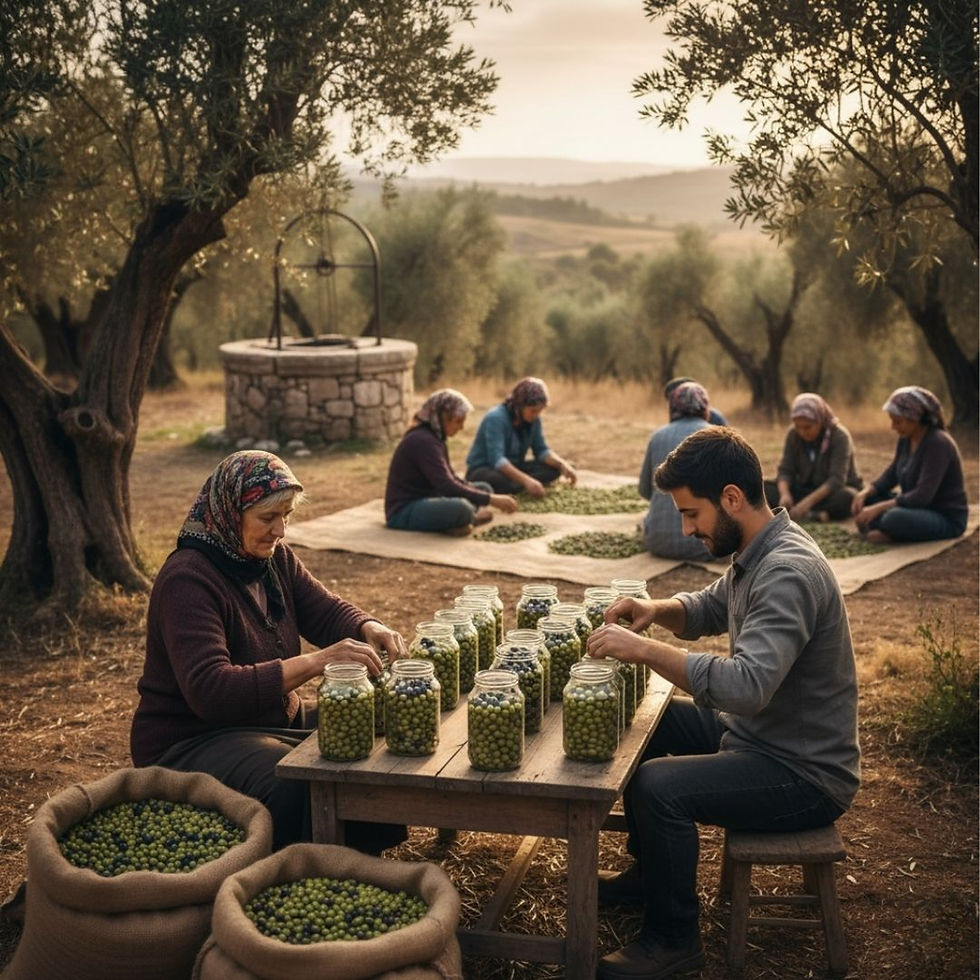An Unusual Friendship: Blackbird and Olive – How Does Gemlik Olive Take Root in Nature?
- fethi çelik

- May 1, 2025
- 3 min read
Gemlik olives, one of Türkiye's most valuable agricultural products, have a unique place among table olives with their unique aroma, high oil content and the fact that they only grow in a certain geography. However, it would be insufficient to evaluate Gemlik olives only by their taste and quality. This article describes the life cycle of the olive tree in nature and the extraordinary relationship it has with its extraordinary natural ally, the blackbird.
The olive tree (Olea europaea) is a species native to the Mediterranean climate. It grows abundantly in Türkiye, especially in the Aegean and Marmara regions. Gemlik olives are large-grained, high-quality black table olives grown in special microclimatic conditions in and around the Gemlik district of Bursa. However, growing an olive tree is not as easy as it seems. Because olive seeds do not germinate easily when placed directly in the soil.
This is where the miracle of nature comes into play: The blackbird comes onto the scene.

The Unusual Closeness of the Blackbird and the Olive Tree
The Blackbird (Turdus merula) is one of the most common songbirds in Europe and Türkiye. It is frequently seen in forests, gardens and olive groves. It especially enjoys consuming olives. However, this does not only meet its nutritional needs; it also plays a vital role in the natural reproduction of the olive tree.
Olive pits are quite hard and woody. They cannot easily germinate when they fall to the ground. However, when a blackbird swallows an olive, the pit enters its digestive system with it. The small stones and acidic fluids in the bird's crop wear away and thin the pit's shell. When it is released into the ground via feces, the pit is now ready to germinate.
The Miracle of the Natural Ecosystem
This is one of the ways nature maintains its ecological balance. The reproduction of olive trees in nature is largely dependent on animals such as blackbirds. Without these birds, many local olive varieties would eventually disappear. This becomes even more critical, especially for geographically indicated and local species.
Geographically indicated products such as Gemlik olives contain a special ecosystem within themselves. The most important natural seed carriers in this system are blackbirds and other birds. Especially for producers who practice organic farming, trees that sprout spontaneously in nature increase soil fertility and support biodiversity.
We Must Protect Blackbirds for the Future of Olive Trees
Today, olive groves are under threat from rapid urbanization, industrialization and harmful agricultural practices. The shrinkage of blackbirds’ habitats could disrupt the natural reproduction cycle of olive trees.
Gemlik olive producers must not only consider high yields but also environmental sustainability. Protecting the habitats of blackbirds ensures that quality olive trees will grow in the future and preserve the balance of nature.
Can There Be Olive Trees Without Blackbirds?
Scientific studies show that most of the olive trees that sprout spontaneously in nature are formed thanks to blackbirds. These naturally sprouted saplings increase genetic diversity and enable olive species to adapt more easily to environmental conditions.
The future of a special and geographically indicated olive variety, such as Gemlik, depends not only on modern agricultural techniques but also on nature’s own rhythm. Without blackbirds, many olive pits will never germinate. Therefore, olive producers must respect and support this silent ecological partnership.
Gemlik olives tell a unique story not only on the table but also in the heart of nature. This special bond with blackbirds ensures the survival of the olive tree and contributes to the continuity of the ecosystem. At the end of the day, all of us producers, consumers and nature lovers are responsible for protecting this delicate balance.



Comments